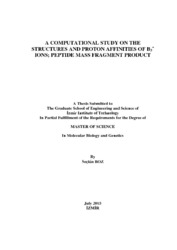Please use this identifier to cite or link to this item:
https://hdl.handle.net/11147/4471| Title: | A Computational Study on the Structures and Proton Affinities of B3+ Ions; Peptide Mass Fragment Product | Other Titles: | Peptit Kütle Bölünme Ürünü Olan B3+ İyonların Yapıları ve Proton Alma İstekleri Üzerine Hesapsal Bir Çalışma | Authors: | Boz, Seçkin | Advisors: | Elmacı Irmak, Nuran | Keywords: | b ions Amino acids Proteins Density functional theory |
Publisher: | Izmir Institute of Technology | Source: | Boz, S. (2015). A computational study on the structures and proton affinities of b3+ ions; peptide mass fragment product. Unpublished master's thesis, İzmir Institute of Technology, İzmir, Turkey | Abstract: | Mass spectrometry is the tool of choice during most of the proteomics studies to get amino acid sequence. However, unambiguously identifying amino acid sequence from mass spectra is not easy and straight forward task. Deeper understanding is needed to support both existing knowledge and develop newer models on dissociation patterns of protonated peptides and it will help to improve efficiency of current algorithms used in peptide identification.
In this study, the structures of b3+ ions and their neutral forms were investigated by using computational methods. First, potential energy surface of b ions are scanned using molecular dynamics simulations and conformer samples are collected. Then, in order to reduce number of conformers, principal coordinate analysis was applied to find and select different structures within the sample. Selected conformers were optimized using density functional theory calculations. Proton affinities of b ions are determined by the energy difference between most stable conformers of the positively charged and neutral peptide fragments.
Different amino acids were used to understand the role of side chain of amino acids on both structures and proton affinities of b3+ ions; XA2+ where X=N, H, C, Y, D, L and F. The results showed that, b3+ ions prefer to have linear oxazolone structure. However, in their neutral states, cyclic structures are relatively far more stable than linear isomers. Histidine display different behavior than other amino acids. Side chain of histidine holds protons and forms stable structures. The energies of cyclic and linear isomers of Histidine containing b ions are close to each other. Histidine containing peptide fragments have larger proton affinity comparing to others. Difference of proton affinities between linear and cyclic conformers varies based on amino acid used. This difference is lower than 10kcal/mol in histidine, asparagine and aspartic acid containing peptide fragments. There is no dramatic position preference of the X-amino acid for the N- or C- terminals or middle position with the exception of Asn and Asp (unlike the center) and Histidine which likes to be at C-terminal. Proteinlerin amino asit dizisini elde etmek için kütle spektrometresi sıklıkla kullanılan bir yöntemdir. Fakat kütle spectrumlarından amino asit dizisini net bir şekilde belirlemek zordur. Peptidlerin kimliklerinin saptanması için kullanılan algoritmaların verimini arttırmak adına protonlanmış peptidlerin gas fazındaki kimyasal özelliklerinin araştırılması ve belirlenmesi gerekmektedir. Bu tez çalışması b3+ iyonları ve bunların nötr hallerinin hesapsal yöntemlerle incelenmesini amaçlamaktadır. İlk olarak bu iyonların potensiyel enerji yüzeyleri moleküler dinamik simülasyonşarıyla taranmış ve konformer örnekleri toplanmıştır. Daha sonra temel bileşen analizi kullanılarak toplanan örnekler içerisinden yapısal olarak farklılık gösteren izomerler belirlenmiştir. Akabinde bu izomerler Yoğunluk Fonksiyonel Theorisi (DFT) kullanılarak optimize edilmiştir. En kararlı pozitif ve nötr izomerlerin enerjileri farkları kullanılarak proton alma istekleri hesaplanmıştır. Bu çalışmada farklı amino asitlerin b3+ iyonlarının yapılarına ve proton alma isteklerine olan etkisini incelemek için, X=N, H ,C ,Y ,D ,L ve F olmak üzere XA2+ peptit parçaları kullanıldı. Sonuçlar b3+ iyonlarının oxazolone yapısında olmayı tercih ettiğini göstermiştir. Öte yandan, yüksüz parçacıklarda halkalı yapıların doğrusal yapılara göre çok daha kararlı olduğu tesbit edilmiştir. Histidinin diğer amino asitlerden farklı bir davranış sergilediği ve yan zinciri protonları tutarak kararlı yapılar oluşturduğu gözlenmiştir. Histidin içeren peptit parçaları daha yüksek proton alma isteğine sahip oldukları gibi halkalı ve doğrusal yapıları arasında büyük enerji farkları bulunmamaktadır. Halkalı ve doğrusal yapılar arasındaki enerji farklı kullanılan amino aside göre değişim gösteriyor. Bu fark histidin, aspartik asit ve asparajin içeren peptit parçalarında 10kcal/mol’den azdır. Ayrıca doğrusal yapılar için, kullanılan amino asitlerin çoğunluğunda peptit parçasının C- ya da N- ucunda veya ortada olması önemli bir fark yaratmazken asparajin ve aspartik asit ortada olmamayı histidin ise C- ucuna yakın olmayı tercih etmektedir. |
Description: | Thesis (Master)--Izmir Institute of Technology, Molecular Biology and Genetics, Izmir, 2015 Full text release delayed at author's request until 2018.09.15 Includes bibliographical references (leaves: 47-49) Text in English; Abstract: Turkish and English viii, 49 leaves |
URI: | http://hdl.handle.net/11147/4471 |
| Appears in Collections: | Master Degree / Yüksek Lisans Tezleri |
Files in This Item:
| File | Description | Size | Format | |
|---|---|---|---|---|
| T001404.pdf | MasterThesis | 1.7 MB | Adobe PDF |  View/Open |
CORE Recommender
Page view(s)
200
checked on Feb 3, 2025
Download(s)
132
checked on Feb 3, 2025
Google ScholarTM
Check
Items in GCRIS Repository are protected by copyright, with all rights reserved, unless otherwise indicated.